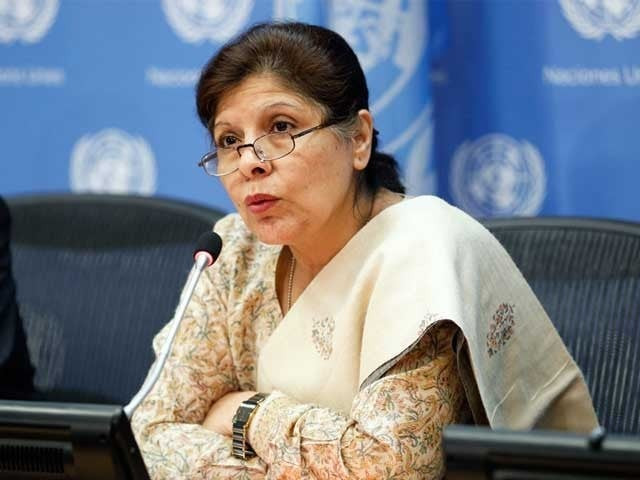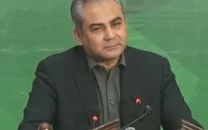Our hands are tied by IMF on ‘subsidies’
Shamshad says there is barely any fiscal space available

Interim Finance Minister Shamshad Akhtar, warning of further increase in power and fuel prices in relation to higher prices in the global markets and lack of availability of any fiscal space for subsidies, on Wednesday said there was no choice but to stick to the International Monetary Fund programme.
In her first public appearance after assuming the responsibility of the interim finance ninister, Dr Shamshad candidly told the Senate Standing Committee on Finance that the government’s coffers were empty and, therefore, no one should pin any hope for subsidies. PPP’s Senator Saleem Mandviwalla chaired the committee meeting.
“Pakistan is an import dependent country and the commodity prices have to be passed on, as we do not have the fiscal space and any room for subsidies, which is going to hurt people -- whether in the shape of electricity or fuel prices,” said Dr Shamshad in her policy statement.
Her remarks in a lighter tone at the floor of the house explained everything about the situation in which she was passing through. “I was wondering why I accepted the job,” said Dr Akhtar in a lighter tone on the floor of the committee.
To a question about giving relief in the electricity bills, Dr Shamshad said that without the IMF, the bilateral and multilateral inflows would not come. “Should we do stuff, which is irresponsible,” she questioned.
She said that the political and the economic uncertainty was the most important issue and the political uncertainty has to be resolved by politicians.
The members of the standing committee posed questions about the interim government’s plan to provide any possible relief in the electricity bills, the uncontrolled value of the dollar against the rupee and the future economic outlook. The rupee hit yet another lowest level of Rs304.5 to a dollar on Wednesday.
Dr Akhtar emphasised that Pakistan did not have a choice but to stick to the IMF programme and implement its all quantitative performance criteria. “The IMF programme is the only source of inflows at this point and other bilateral and multilateral inflows are tied up with the IMF inflows,” said Dr Shamshad.
The statement came a day after the IMF refused to immediately approve Pakistan’s request for recovering August’s electricity bills over a period of six months amid raging protests in many parts of the country that continued for the sixth day running against back-breaking bills.
She further stated that the previous government had agreed on “adjustments” with the IMF and the incumbent set-up could not do anything in this regard.
But she said that it was not the IMF that was worrying her, rather it was Pakistan’s domestic economic conditions, which are worse than anticipated.
So far, the caretaker government has failed to come up with any solution. It is trying to avoid breaching the conditions of the IMF programme that require keeping the overall circular debt at Rs2.310 trillion and timely passing on the increase in electricity prices on account of annual, quarterly and monthly adjustments.
Dr Akhtar said the state-owned enterprises were causing “unbelievable losses”. The next elected government would have to re-engage with independent power producers, Akhtar stated to a question about renegotiating the power purchase agreements.
She said that there was barely any fiscal space available, as 70% of Pakistan’s tax revenue was being spent on interest payments. “Unfortunately, we have done everything to weaken the economy,” she lamented.
The finance minister also debunked the perception that the caretaker government had “unlimited powers”. “We have limited options and will work within them,” she said.
The interim finance minister showed her inability to withdraw the free electricity being availed by many influential groups of the Pakistani society, saying the privileges were in place for decades and cannot be withdrawn at this stage.
A number of committee members raised concerns regarding rising dollar and sky-high electricity bills. There was nothing for us in the policy statement given by the finance minister, said senator Kamil Ali Agha of the PML-Q.
Agha said that the people were burning the electricity bills and the government was reluctant to play any role. PPP Senator Sherry Rehman said that the situation has become very critical, as the electricity bills have broken people’s backs and forced them to the streets. “If the people do not pay their bills, it would lead to breakdown of society and that will be embarrassing for the state,” said Senator Rehman.
The committee also expressed concerns over the growing dollar instability, unprecedented electricity cost and a 22% interest rate that are making it challenging for current businesses to survive and thrive.
Dr Shamshad stated that the economy needs a lot of fixing and the ministry is tirelessly working on multilateral fronts to deliver the task. The caretaker finance minister sought one week's time to give a briefing on the state of economy and the way forward.
While briefing about the reasons behind soaring inflation, the deputy governor of SBP said that inflation in Pakistan was not demand driven, therefore, the interest rate hike was not working as an important tool to curb the prices.
He, however, said that there was a visible impact on the higher interest rates on the inflationary expectations, which have tamed down.
The senate body was briefed on the Azad Jammu and Kashmir Budget. Chaudhry Anwarul Haq, the Prime Minister of AJK, appeared in the committee and made an emphatic plea to address the economic woes of the special territory, warning that the youth of Kashmir might soon start demanding its rights.
The AJK PM said that the region produces about 2,600MW of electricity but it does not get 350MW for its own needs.
He appealed to the government to provide electricity to the people of AJK at production costs and requested the allocation of the Rs90 billion shares mentioned in the Federal Divisible Pool.
The committee recommended the government to address the reservations expressed by the AJK prime minister.

1724319076-0/Untitled-design-(5)1724319076-0-208x130.webp)

















COMMENTS
Comments are moderated and generally will be posted if they are on-topic and not abusive.
For more information, please see our Comments FAQ